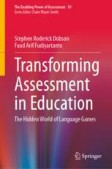Search
Search Results
-
Measuring the Master Adaptive Learner: Development and Internal Structure Validity Evidence for a New Instrument
BackgroundThe master adaptive learner (MAL) uses self-regulated learning skills to develop adaptive, efficient, and accurate skills in practice....
-
Learning-oriented assessment in the classroom: the contribution of self-assessment and critical thinking to EFL learners’ academic engagement and self-esteem
The core of self-assessment (CSA) and critical thinking (CT) empower learners to observe and evaluate themselves. Although the literature on CSA and...

-
Comparing the effects of computerized formative assessment vs. computerized dynamic assessment on develo** EFL learners’ reading motivation, reading self-concept, autonomy, and self-regulation
This research compared the impacts of computerized formative assessment (CFA) and computerized dynamic assessment (CDA) on students’ motivation,...
-
Develo** and evaluating a pollination systems knowledge assessment in a multidisciplinary course
BackgroundAlthough pollinators play an integral role in human well-being, their continued global decline reflects the need to provide and evaluate...

-
Group dynamic assessment vs. computerized dynamic assessment: impacts on L2 listening development, L2 students’ perfectionism, foreign language anxiety, and intrinsic motivation
Dynamic assessment is heavily based on Vygotskian socio-cultural theory and in recent years researchers have shown interest in the theory as a way to...
-
Assessment, Testing, and Evaluation: A Section Introduction
The need to rethink assessment, testing, and evaluation is urgent. This book is a collection of representative studies that examine and share...
-
Metrics of student dissatisfaction and disagreement: longitudinal explorations of a national survey instrument
This study explores dissatisfaction and neutrality metrics from 12 years of a national-level undergraduate student survey. The notion of...

-
Validating a Multiple-Choice Modelling Competencies Assessment
As part of a larger project focused on exploring development of mathematical modelling competencies among post-secondary STEM majors enrolled in...
-
De Novo Reliability Synthesis in Assessment for Continuing Quality Improvement
This chapter delves into the transformative approach of De Novo Reliability Synthesis (DNRS) within the realm of assessment for continuing quality...
-
Digital Assessment and the “Machine”
In this chapter, we explore assessment that is performed automatically by the digital environment, what might be called assessment “through...
-
Integrated Planning of Teaching and Assessment
This chapter discusses the importance of planning teaching and assessment in an integrated manner, emphasizing the need to view assessment and...
-
The comparative effect of computerized dynamic assessment and rater mediated assessment on EFL learners’ oral proficiency, writing performance, and test anxiety
This study aimed to examine the impacts of computerized dynamic assessment (C-DA) and rater-mediated assessment on the test anxiety, writing...
-
A proposed analytic rubric for consecutive interpreting assessment: implications for similar contexts
The present study aimed to develop an analytic assessment rubric for the consecutive interpreting course in the educational setting in the Iranian...

-
Learning Assessment Tools: Which One to Use?
This chapter addresses the main learning assessment instruments used in a school classroom: tests, checklists, assessment scales, and rubrics. In the...
-
Assessment as Connoisseurship
In this chapter we ask a simple question: How can creativity be assessed? This entails exploring generative mechanisms and structures supporting...
-
Peer assessment in group-oriented classroom contexts: on the effectiveness of peer assessment coupled with scaffolding and group work on speaking skills and vocabulary learning
Peer learning, also known as collaborative learning, is based on social constructivism and contends that learning takes place more actively when...
-
Students as Teachers: Development and Implementation of a Workplace-Based Assessment
Students as Teachers programs are prevalent, though assessments within these programs are lacking. A workplace-based assessment for clinical teaching...

-
Comparison of PRISM and numeric scale for self-assessment of learning progress during a clinical course in undergraduate dental students
ObjectivesTo compare Pictorial Representation of Illness and Self-Measure (PRISM) and a numeric scale for self-reflection in dental students.
...
-
Technology-Based Assessment of Phonological Awareness in Kindergarten
Previous research has shown that phonological awareness is one of the most important prerequisites for early reading. Monitoring its development...

-
Assessing Pre-service Teachers’ Views of Scientists, Their Activities, and Locations: the VoSAL Instrument
In science education, learners’ conceptions of scientists and their work are often assessed by the Draw-A-Scientist Test (DAST). Due to validity...

